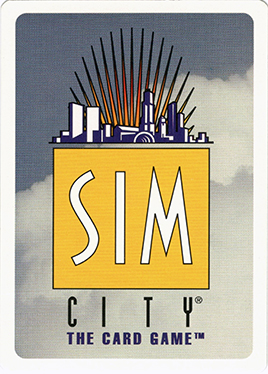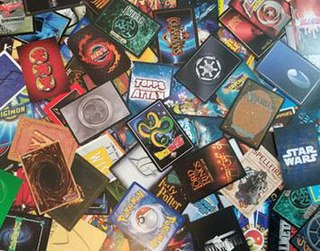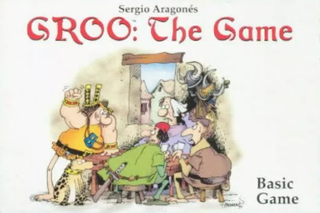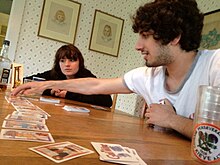Tigris and Euphrates is a tabletop eurogame designed by Reiner Knizia and first published in 1997 by Hans im Glück. Before its publication, it was highly anticipated by German gamers hearing rumors of a "gamer's game" designed by Knizia. Tigris and Euphrates won first prize in the 1998 Deutscher Spielepreis. A card game version was released in 2005.

Deadlands is a genre-mixing alternate history role-playing game which combines the Western and horror genres, with some steampunk elements. The original game was written by Shane Lacy Hensley and published by Pinnacle Entertainment Group in 1996.

Doomtown is an expandable card game based on the Deadlands role-playing game. It was originally a collectible card game that ran from 1998 through 2001, published by Wizards of the Coast (WotC) under license to Pinnacle Entertainment Group until January 2000, when WotC quit production and the license transferred to Alderac Entertainment Group; its last expansion for many years was Do unto Others from 2001. In 2014 the game was revived with updated rules and sold in non-randomized expansions.

El Grande is a German-style board game for 2-5 players, designed by Wolfgang Kramer and Richard Ulrich, and published in 1995 by Hans im Glück in German, by Rio Grande Games in English, and by 999 Games in Dutch. The game board represents renaissance-era Spain where the nobility fight for control of the nine regions. El Grande was praised for its area-control mechanism, and was awarded the Spiel des Jahres prize and the Deutscher Spiele Preis in 1996. Following its release, several expansions and an alternative version were published.

The 'Neopets TCG' is an out-of-print collectible card game and a spin-off of the popular virtual pet browser game, Neopets. The game was launched in 2003 and produced by Wizards of the Coast, a large trading card company that produces a variety of other trading card games. Neopets is aimed at a slightly younger audience than other Wizards of the Coast offerings such as Magic: The Gathering. As with many other trading card games, the cards serve two purposes, collecting and playing a game.

Middle-earth Collectible Card Game (MECCG) is an out-of-print collectible card game released by Iron Crown Enterprises in late 1995. It is the first CCG based on J.R.R. Tolkien's fictional universe of Middle-earth, with added content from ICE's Middle-earth Role Playing Game.

MLB Showdown is an out-of-print collectible card game made by Wizards of the Coast that ran from April 2000 to 2005. The game was introduced to the public in 2000, featuring Atlanta Braves third baseman Chipper Jones on the product cover. Since the 2000 base set, cover athletes have included Shawn Green, Gary Sheffield, Manny Ramírez, Luis Gonzalez, Torii Hunter, Albert Pujols, and Craig Biggio.

The Star Wars Roleplaying Game is a d20 System roleplaying game set in the Star Wars universe. The game was written by Bill Slavicsek, Andy Collins and J. D. Wiker and published by Wizards of the Coast in late 2000 and revised in 2002. In 2007, Wizards released the Saga Edition of the game, which made major changes in an effort to streamline the rules system.

TransAmerica is a railroad board game centered on the construction of railroad track in the United States. The game was created by Franz-Benno Delonge and developed by Team Annaberg. It is published in the United States by Rio Grande Games. In 2003 it was a Mensa Select recipient, and was nominated for the 2002 Spiel des Jahres award.
The Catan Card Game, originally named The Settlers of Catan: The Card Game, is a card-game adaptation of The Settlers of Catan board game. It is a member of the Catan series of games developed by Klaus Teuber and published by Kosmos in German, and by Mayfair Games in English. The Catan Card Game is a two-player game, although the rules can be accommodated as to allow players to share a set or for each player to have their own, as is intended for tournament play. Seven expansions of the Catan Card Game have also been released.

The X-Files Collectible Card Game is an out-of-print collectible card game based on The X-Files fictional universe. The game was developed by NXT Games and published by the US Playing Card Company (USPCC) in 1996. The game was canceled in early 1998.

Shadowrun: The Trading Card Game is an out-of-print collectible card game, released by FASA in August 1997 as a spin-off from FASA Corporation's Shadowrun role-playing game and used the same scenario, a cyberpunk setting with fantasy elements – an apocalyptic near-future Earth, with advanced technology which was also populated by magic and supernatural beings such as elves and dragons.

Coloretto is a card game designed by Michael Schacht, originally published in 2003. The game cards depict chameleons, showing that "a player may change his color many times during the game". Rules are provided in both English and French. The published game is designed for 3–5 players, but rules for a two-player version of the game are available at the Rio Grande Games website.

Sim City: The Card Game is an out-of-print collectible card game based on the video game SimCity by Maxis. The goal of the game is to build a city from the ground up. Players take turns playing cards representing city blocks and collect profit.

Gong Zhu (拱猪) is a Chinese four-player trick-taking card game that is similar to Black Lady, the leading member of the Hearts family. However, it differs in that it assigns quite different point values to cards. The objective of the game is to score positive points and avoid penalty points. Gong Zhu means: Push Out the Pig, for "pig" is the name given to the Q♠.

A collectible card game (CCG), also called a trading card game (TCG) among other names, is a type of card game that mixes strategic deck building elements with features of trading cards. It was introduced with Magic: The Gathering in 1993.

The BattleTech Trading Card Game is an out-of-print collectible card game (CCG) set in the BattleTech universe. The game was developed by Wizards of the Coast (WotC) for FASA and released in 1996. It went out of print after its last expansion, Crusade, in 1998.

Honor of the Samurai is a card game published by Gamewright in 1996 with a feudal Japanese setting that uses the themes of honor and family.

Groo: The Game is a card game published by Archangel Studios in 1997 that is based on the comic book Groo the Wanderer by Sergio Aragonés.

Abduction is a 1998 collectible card game (CCG) published by Eden Studios in 1998 in which players must escape from an alien ship.


















